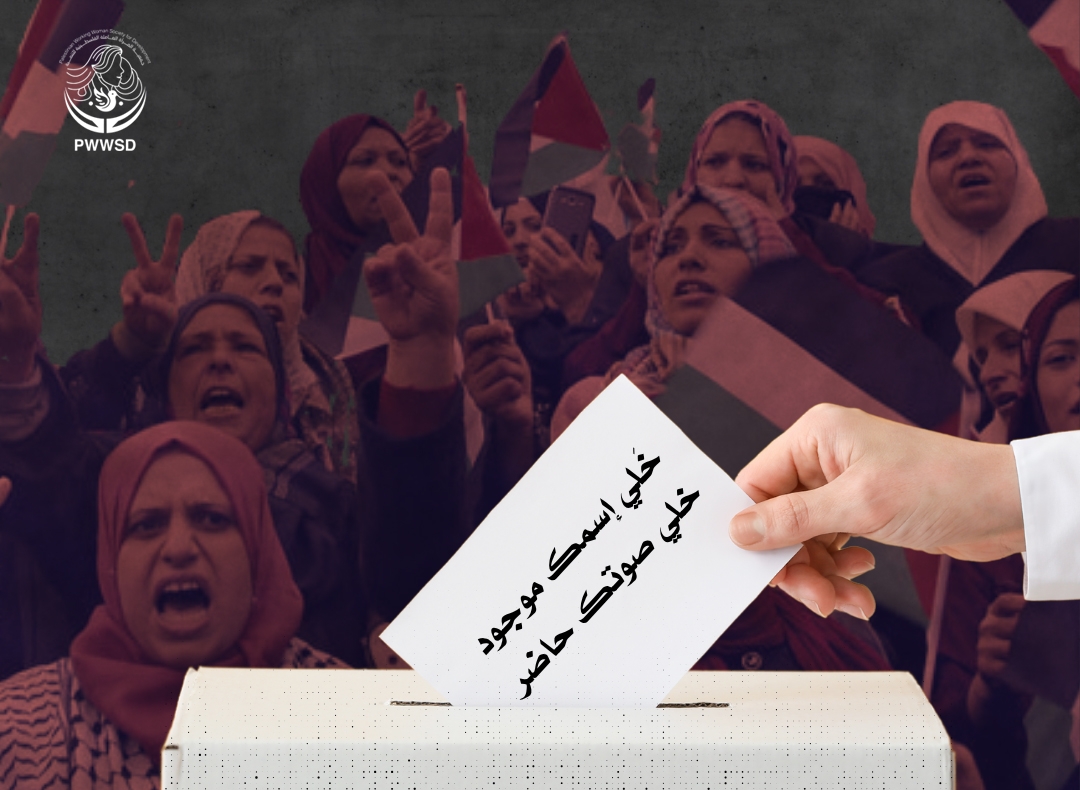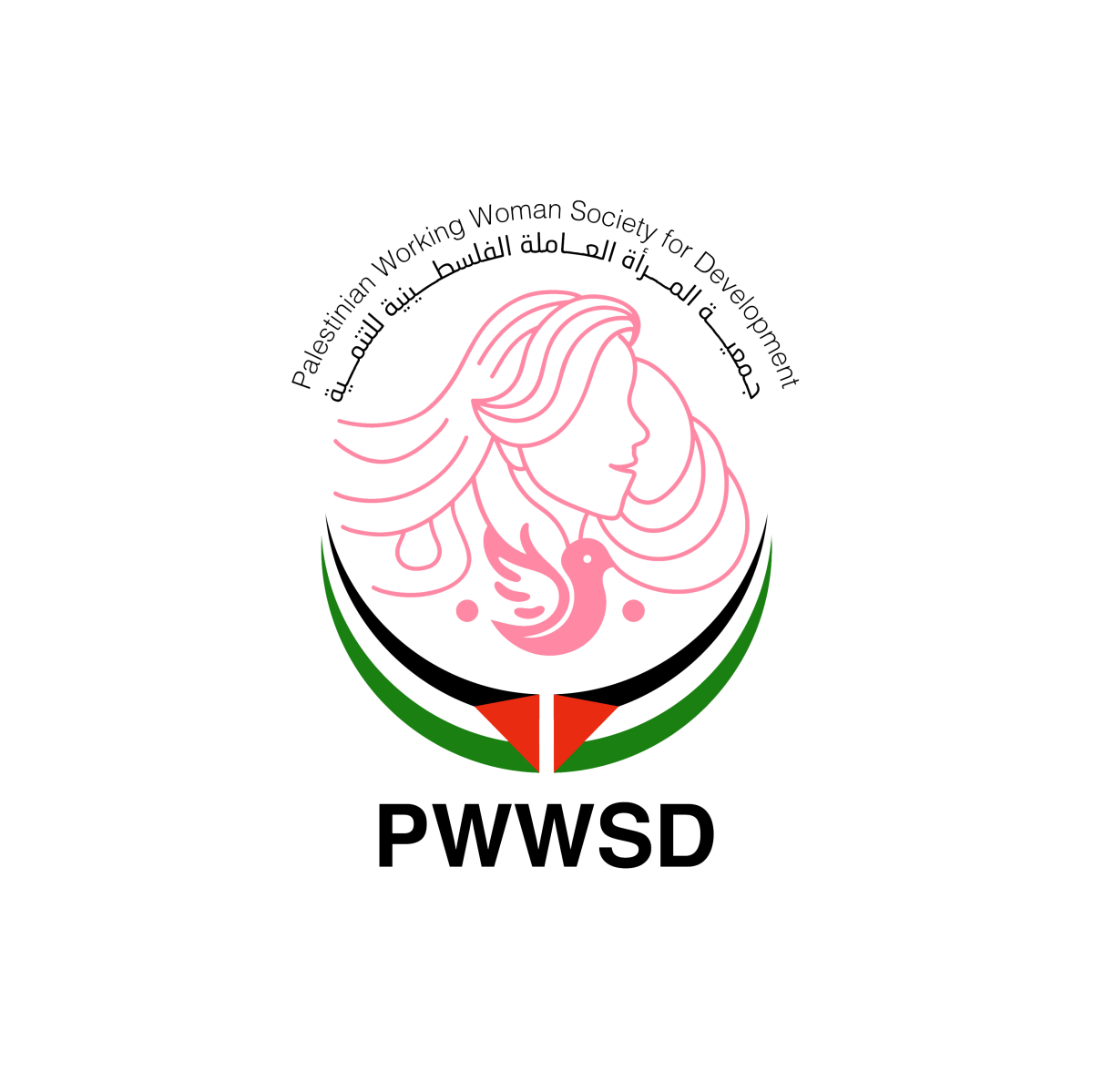An electronic survey reveals that 9 out of 10 citizens support women's political presence

Tuesday, August 12, 2025
An electronic opinion poll conducted by the Palestinian Working Woman Society for Development between July 31 - August 8, 2025, revealed strong public support for women's political participation in Palestine. The survey included 330 participants from various governorates of the West Bank. The results showed that 87% of participants consider women's political participation a fundamental right and urgent necessity, reflecting a cumulative transformation in Palestinian political awareness toward gender equality in political representation.
The survey included a diverse geographical and age sample, distributed across the main West Bank governorates, including Nablus, Ramallah, Jenin, Bethlehem, and Hebron, and included age groups from 18 years and above. The percentage of females was 80.6% compared to 19.4% males, indicating growing interest from women in political issues related to their rights in participation and representation.
Although 87% of participants consider women's political participation a fundamental right and urgent necessity, the survey results revealed that 77% of participants are ready to vote for qualified female candidates, while only 53% expressed their readiness to support women during the candidacy period through contributing to electoral campaigns, building networks, encouragement, and funding (where possible). This demonstrates that the gap still exists between theory and practice - as matters move toward practical applications, the readiness for practical support relatively decreases. The survey also showed that 59.7% of participants believe that women's participation in decision-making improves political, economic, and social conditions, reflecting increasing belief in the positive impact of women's leadership.
Regarding electoral systems, the results showed that 66% of participants prefer the open list system, which allows voters to elect a specific list according to its electoral program, and the voter chooses individuals from within the same list, despite differing opinions about this system's impact on women's electoral opportunities. Participants were split equally between those who believe open lists reduce women's chances of winning due to prevailing social culture, and those who see them as increasing opportunities as a result of growing societal awareness.
Regarding quotas and women's representation, 59.7% of participants supported maintaining women's quota at no less than 30%, while 67% supported women occupying advanced positions in electoral lists - the first, second, and third ranks. Additionally, 57.9% expressed support for women assuming leadership of local authorities. Despite these relatively acceptable results, they indicate the need to continue community awareness about the importance of women's leadership participation in senior executive positions.
On an issue related to practices that embodied electoral violence in previous electoral experiences, the survey results showed that 50% of respondents consider erasing women's photos and/or names during electoral campaign periods and replacing them with symbols as unacceptable behavior, while 12% held political parties primarily responsible for maintaining women's names and photos in all forms of electoral campaigning, and 33% of participants supported the necessity of having a legal text obligating electoral lists to adopt women's photos and names as they appeared in candidacy applications.
Regarding respondents' opinions about including women in negotiations during electoral list formation, the results showed that 63% strongly support the necessity of including women in this process. This demonstrates increasing societal orientation toward the necessity of including women in negotiating electoral list formation, whether by political parties, families, or those generally responsible for forming lists.
Samar Hawash, Manager of the Political Participation and WPSA Program at the Palestinian Working Woman Society for Development, said: "The results of this survey confirm that positive changes have occurred in Palestinian society, and it has largely come to realize the importance of women's political participation as a fundamental right and not merely a privilege, as a result of the cumulative efforts of women's and rights organizations. This positive change that appeared in the survey results forms a solid foundation that can be built upon to achieve real political reforms that ensure fair and effective representation of women in decision-making centers."
On a related level, participants identified several obstacles that limit women's effective political participation, most notably traditional social culture, absence of adequate support systems, economic constraints that affect women's ability to participate in electoral campaigns, in addition to weak real integration of women in political processes. Participants pointed to the necessity of legal reforms that raise quotas to 50%, develop comprehensive training programs for political skills, and launch community awareness campaigns to confront gender stereotypes.
Regarding the required qualities in women's leadership, the ability to lead and make decisions ranked first with 280 votes, followed by experience in community work with 261 votes, then integrity and transparency with 200 votes. This ranking indicates that voters apply consistent standards regardless of gender, focusing on functional and ethical capabilities rather than symbolic qualities.
Mahmoud Al-Fiqy, Development and Communication Manager at PWWSD, added: "This survey provides a clear roadmap for official institutions, political parties, and civil society organizations on how to translate popular support for women's political participation into tangible policies and practices. The results show that we have fertile ground for change, and what is required now is political will and institutional commitment to transform this support into a new political reality that reflects Palestinian society's aspirations for achieving justice and equality."
Government, family and society, women's rights organizations, and political parties were classified as main entities in promoting women's political participation, with government ranking first among most participants in this context. This classification reflects clear expectations regarding the entities that bear primary responsibility for leading the required change, while emphasizing the necessity of coordination among all these entities to ensure the success of any reform initiatives.
This survey comes amid the continuation of the genocide war on Gaza and increasing aggression in the West Bank, and at a time when Palestine is witnessing important discussions about the relationship between national liberation and democratic transformations and the necessity of developing the political and electoral system. Only 51% of participants expressed support for conducting local elections on schedule despite current political circumstances, while a similar percentage did not support conducting elections under current circumstances. This is mostly due to changes in citizens' priorities resulting from deteriorating political, economic, and social conditions in Palestine, in addition to the impact of continued division on the Palestinian street. Nevertheless, this support indicates a desire to continue the democratic process and enhance political participation even under existing challenges.
The results of this survey constitute an important reference for policymakers, civil society actors, and women's rights advocates, providing accurate understanding of future challenges and opportunities in promoting Palestinian women's political participation. It also lays the foundations for developing comprehensive strategies aimed at transforming popular support into tangible reforms and inclusive governance that reflects societal diversity and ensures fair representation of all segments of the Palestinian people.
To view the report results, please click here: https://tinyurl.com/yp7ebu6b
For a detailed analysis of the report results, please click here: https://tinyurl.com/yqdggmqh






